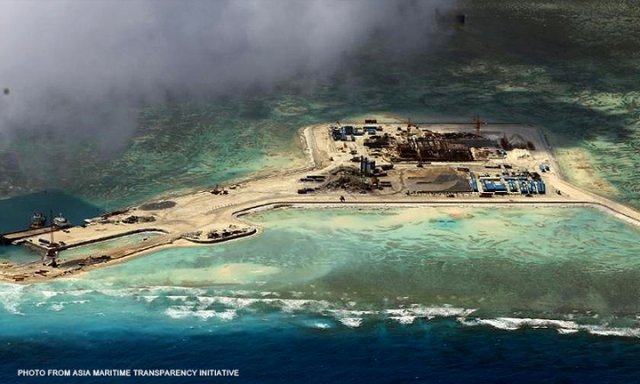The HAGUE: Awarding the Philippines “sovereign rights” over three disputed areas, a UN-backed tribunal has ruled that China has no historic title to nearly the entire South China Sea.
In a landmark unanimous ruling, the Permanent Court of Arbitration based in The Hague has awarded the Philippines sovereign rights over Panganiban or Mischief Reef, Ayungin or Second Thomas Shoal and Recto or Reed Bank off Palawan, reported Philippine Star.
The court did not award sovereign rights to the Philippines over Panatag or Scarborough Shoal, which lies just over 120 nautical miles from Zambales. But the court said it was a traditional fishing ground for several countries and neither China nor the Philippines had the right to prevent anyone from fishing in the shoal, the report said.
China therefore violated Philippine rights when it barred Filipino fishermen from entering the shoal, the court reportedly declared.
Noting that both the Philippines and China had ratified the United Nations Convention on the Law of the Sea (UNCLOS), on which the court ruling was based, the arbitral tribunal pointed out that UNCLOS provides that the “award… shall be complied with by the parties to the dispute.”
China had refused to participate in the arbitration except to challenge its jurisdiction over the maritime dispute. But the court ruled last year that it had jurisdiction over the case, said the news portal.
Ruling that Beijing’s so-called “nine-dash line” historic claim over nearly all of the South China Sea has “no legal basis,” the tribunal also reportedly ruled that China violated Philippine sovereign rights by constructing artificial islands and interfering with Filipino fishing activities.
China’s island reclamation also aggravated the maritime dispute and caused irreparable harm to the marine environment, the tribunal ruled.
“The tribunal concluded that there was no legal basis for China to claim historic rights within the sea areas falling within the ‘nine-dash line’,” The Hague-based Permanent Court of Arbitration (PCA) said in a statement.
Manila – which had lodged the suit against Beijing in 2013 – welcomed the ruling, with Foreign Affairs Secretary Perfecto Yasay Jr. saying the decision “upholds international law, particularly the 1982 UNCLOS.”
“In the meantime, we call on all those concerned to exercise restraint and sobriety,” he said.
China reacted furiously, saying it “does not accept and does not recognize” the decision. Beijing had refused to participate in the case, saying the tribunal had “no jurisdiction” over the issue.
Beijing claims most of the South China Sea, even waters approaching neighboring countries, as its sovereign territory, basing its arguments on Chinese maps dating back to the 1940s marked with a so-called nine-dash line, reported Philippine Star.
But in its hard-hitting ruling, the PCA reportedly said Beijing “had no historic rights to resources in the waters of the South China Sea” and that “such rights were extinguished to the extent they were incompatible with the exclusive economic zones provided for in the Convention,” referring to UNCLOS.
While “bad faith is not presumed” under the fundamental principle of international law, UNLOS provides that “award… shall be complied with by the parties to the dispute,” it added.
“China had violated the Philippines’ sovereign rights in the exclusive economic zone by interfering with Philippine fishing and petroleum exploration, by constructing artificial islands and failing to prevent Chinese fishermen from fishing in the zone,” the PCA was quoted as saying.
The tribunal further ruled that the disputed Spratly islands “cannot generate maritime zones collectively as unit” as claimed by China.
The judgment comes against the backdrop of frequent military brushes between China and its Asian neighbors the Philippines, Vietnam, Malaysia, Brunei and Taiwan, which ring the waters believed to hold untapped oil and gas reserves, said the news portal.
The court also held that fishermen from the Philippines and China had traditional fishing rights at the Scarborough (Panatag) Shoal and that China had interfered with these rights in restricting access to the area, reported Philippine Star.
The Chinese seized Panatag Shoal in 2012 after a standoff with the Philippine Navy which tried to arrest Chinese poachers in the area, the report said.
It also reportedly held that Chinese law enforcement vessels “had unlawfully created a serious risk of collision when they physically obstructed Philippine vessels.”
The tribunal cited the “harm to the environment” caused by China’s large-scale reclamation and island building activities in the South China Sea. Such construction activities, the tribunal said, were “incompatible with the obligations of a state during dispute resolutions proceedings,” citing China’s having inflicted “irreparable harm” to the marine environment, built artificial island in Philippine waters and “destroyed evidence of natural condition of features in the South China Sea” that were being disputed, the news portal highlighted.




